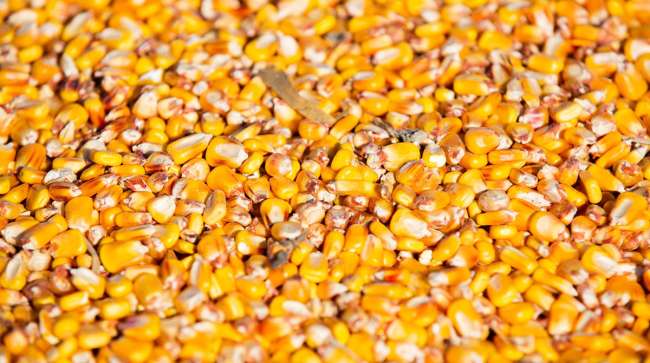Senior Reporter
Louisiana Ports Shutdown May Impact Agriculture Exports

[Stay on top of transportation news: Get TTNews in your inbox.]
The Port of New Orleans, the Port of Baton Rouge and the Port of South Louisiana are not the largest facilities in the country, but they are among the most important when it comes to shipping grain commodities worldwide, especially soybean and corn.
Hurricane Ida barreled into the Louisiana coast Aug. 29, packing winds more powerful than Hurricane Katrina and a “catastrophic” storm surge that left New Orleans without power and facing mass flooding and destruction. Katrina struck 16 years to the day earlier, leaving an estimated $108 billion in damage in its wake.
With the Louisiana port facilities shut down, many in the agriculture industry are taking a wait-and-see approach as to how long they will remain closed.

Steenhoek
“Anytime there is an actual disruption of transportation out of the Mississippi Gulf region, it merits attention from our industry,” said Mike Steenhoek, executive director of the Soy Transportation Coalition. “Sixty-one percent of U.S. soybean exports and 58% of corn exports depart from export facilities along the lower Mississippi River in the New Orleans area. It’s certainly some kind of concern.”
The Soy Transportation Coalition, based in Des Moines, Iowa, is made up of 13 state soybean boards, the American Soybean Association and the United Soybean Board. The states represented on the board account for 85% of total U.S. soybean production. The coalition’s goal is to position the soybean producers to benefit from a cost-effective, reliable, and competitive transportation system.
Steenhoek said restoring power to the region, which some experts say could take weeks, and accessing the damage caused by the hurricane are the top priorities in the agriculture community. He said some soybeans and corn may shift temporarily to the Port of Oakland and Seattle/Tacoma, Wash., while the damage in Louisiana is repaired.
When those ports reopen is especially important to farmers in Minnesota, Wisconsin, Illinois and Iowa, as well as other states that border the Mississippi River and ship hundreds of thousands of tons of dry bulk commodities down the 2,320-mile waterway on barges.
Adding to the challenge for the agriculture and trucking communities is that farmers nationwide are in the midst of harvest time, and some fear the likely delays at those southern Louisiana facilities will cause additional backups in an already overtaxed supply chain.
The timing is not good. It is harvest season. Everyone is gearing up for that, and here in Iowa, we are anticipating a bumper crop.
Iowa Motor Truck Association President Brenda Neville
“We’ve been watching it very closely because this is an important area for truckers,” Iowa Motor Truck Association President Brenda Neville told Transport Topics. “The timing is not good. It is harvest season. Everyone is gearing up for that, and here in Iowa, we are anticipating a bumper crop. Especially in the central part of the state, we could have some very strong yields.”
According to the U.S. Department of Agriculture, corn is the biggest export crop in Iowa, and soybeans rank third. Just from Iowa, the two crops are responsible for more than $1.5 billion in exports, and soybeans are the fastest-growing export crop from that state.
Port of New Orleans officials said the facility would remain closed for an indefinite period.
“Port NOLA crews are assessing Hurricane Ida impacts. Initial reports indicate no major damage to our facilities. We are coordinating with navigation partners as well as local and state officials so we can resume operation safely and as quickly as possible,” a port statement said.
With Ida approaching Louisiana on Aug. 28, the U.S. Coast Guard closed the lower Mississippi River to all vessel traffic, and there is no indication when it will reopen.
IHS Markit Transportation Economist Paul Bingham told TT restoring the power at the port is critical. Still, other challenges along the Mississippi River relating to the storm may slow the flow of agriculture exports.
“It’s the connectivity on the trucks and rail. It’s the road network. It’s storage facilities that feed that, the barge operations that have been disrupted, and the channel clearance issues,” Bingham said. “That takes a little while, and usually, the port terminal operations are back in operation before that. I don’t think it will last two weeks, but it will be disruptive.”
I don’t think [the ports shutdown] will last two weeks, but it will be disruptive.
Paul Bingham, transportation economist for IHS Markit
Bingham also said another critical factor is the weather in September, and it is not uncommon for the Gulf Coast to experience multiple hurricanes.
In the aftermath of Hurricane Katrina, Soy Transportation Coalition’s Steenhoek said, port officials did a good job upgrading the facilities to make them more storm resilient, which may pay dividends in the aftermath of this storm.
“Sometimes there is a pretty quick recovery and they can resume operations shortly after the hurricane passes,” he said, “and we’re hopeful that will be the case here.”
Want more news? Listen to today's daily briefing below or go here for more info:






